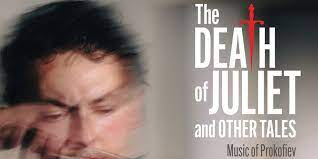Prokofiev, when I was a young listener, specifically as it was in the USA, was distinctly not as popular as Stravinsky, at least in general terms. There of course were reasons for this, partly that Stravinsky was on the American musical scene.
Nonetheless I check in today with a welcome new release of works for violin, namely Yevgeny Kutik's The Death of Juliet and Other Tales, Music of Prokofiev (Marquis 114718162328). In the realm of Prokofiev chamber music violin performances there of course is Oistrakh as a sort of benchmark, with Heifetz on the sweeter end, then Stern more or less in the expressive middle, and my favorite version of the Violin Sonatas on an old Columbia recording, that by Joseph Szigeti.
Yevgeny Kutik takes on the Sonata No. 2 as his own and acquits himself well. He has some of the exuberant, almost strident enthusiasm of Szigeti, with some of the sweetness of Heifitz. Pianist Anna Polonsky forms a vibrant and engaged counterpart throughout.
I am not one to complain, but the graphics on this CD, like so many others these days is not geared to be readable. The list of selections is printed in a very small point size, a goopy red which when put onto a gray screen is impossible to read. So there are other compositions here and let me try to decipher what they are. There is a short solo violin piece that I cannot possibly decipher the name of. It is traditional, arranged by Kutik. There is another nicely attractive solo violin version of "The Death of Juliet," and a fine thing it is. It is plaintive, sorrowful and unmistakenly Prokofievian! The old standby "Song of the Volga Boatman" is arranged by I can not read who. Sorry, the booklet design makes reading quite difficult. Then there is "Kalinka for Solo Violin" by Ivan something-or-other, arranged by somebody or other. Again, I apologize for my inability to read it all.
Happily there follows Prokofiev's "Sonata for Solo Violin" which is given a brilliant reading. Then follows two traditional pieces for solo violin, arranged by folks other than Prokofiev.
And then as already mentioned the Violin Sonata No. 2 concludes the program with a very personal, dedicated performance that may not quite reach the heights of Heifetz, Kogan or Szigeti, but it holds is own in spite of that.
All in all this volume heralds Kutik as a major force in Russian violinists today. Any fan of Prokofiev and Russian tradition will find this to their liking I suspect.

No comments:
Post a Comment